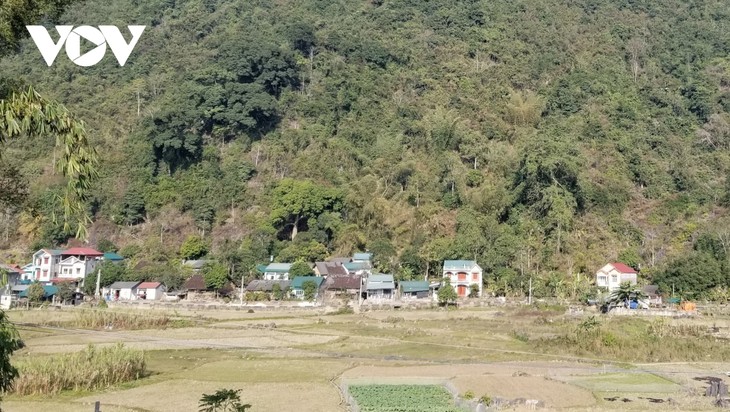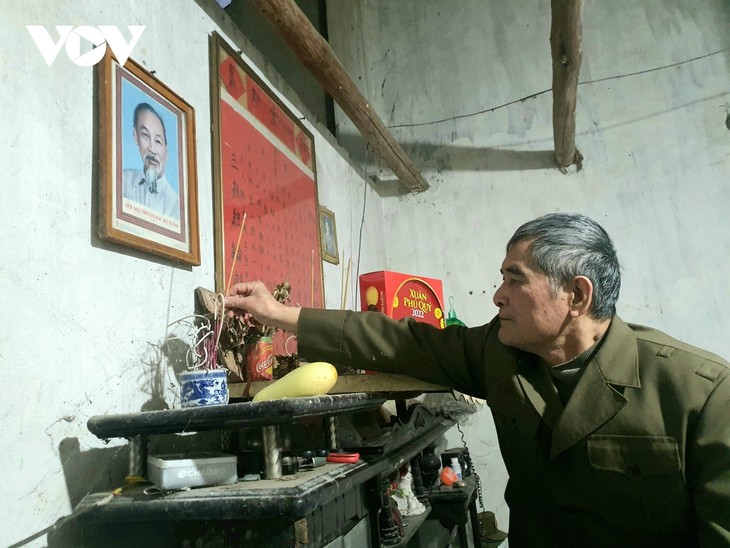(VOVWORLD) - On January 28, 1941, President Ho Chi Minh returned to Vietnam after a 30-year journey to seek national salvation. He set foot in Pac Bo in Ha Quang district, Cao Bang province. Since that time, the image of President Ho chi Minh, locally called “Ong Ke” as a loving tribute, has been imprinted in the hearts of the people of Pac Bo. VOV’s Cong Luan has a story about President Ho Chi Minh on the occasion of his 132nd birth anniversary on 19 May.
 Today Pac Po hamlet has greatly changed. Today Pac Po hamlet has greatly changed. |
Pac Bo hamlet was destitute. The villagers didn’t have enough food to eat or warm clothes to wear.
At that time, a visitor came to Bo Bam village who was tall and thin and had a kind face. Nobody knew his name, but some called him “Ong Ke”. In the Tay language, "Ong Ke" means "old man", an informal and intimate way to refer respectfully to an elderly man.
“Ong Ke” took care of everyone. He bathed small children, helped the elderly, taught young people to read, taught the locals how to grow vegetables and increase their production.
Educated by “Ong Ke”, the people of Pac Bo awakened to the ideas of the revolution. After a time, revolutionary organizations of farmers, young people, and children were established in Hà Quảng district.
Like a spark lit by Uncle Ho in Pac Bo, the revolutionary movement spread throughout the nation, and flared into a revolutionary storm to liberate the nation from the yoke of miserable slavery.
The spacious stilt house of Ms. Hoang Thi Khin is located at one end of Pac Bo hamlet.
Mrs. Khin and her husband, Nong Quoc Phong, sheltered President Ho Chi Minh and gave him rice.
Mrs. Khin used to tell her children and visitors the story of how the Pac Bo villagers united to defend "Ong Ke" and follow the revolution.
“Revolutionary organizations of women for national salvation and youths for national salvation were established. I followed Ho Chi Minh and stayed in a tent in Khuổi Nậm to cook meals for him. One person couldn’t make the revolution a success but hundreds of local people, particularly those from Hòa An and Hà Quảng, participated in militia training for the revolution. In Khuoi Nam, we cooked rice in bamboo tubes or porridge for Ho Chi Minh and the other revolutionaries,” said Mrs. Khin.
 Duong Chi Quan burns incense to pay gratitude toward ancestors and Uncle Ho. Duong Chi Quan burns incense to pay gratitude toward ancestors and Uncle Ho.
|
75-year-old Duong Chi Quan of Pac Bo hamlet couldn’t hide his emotion and pride when he said he is the grandson of Duong Dinh who was close to Ho Chi Minh while he was starting the revolutionary movement in Pac Bo.
“My father said Uncle Ho used to come at night to talk to the people of Pac Bo. In Duong Dinh's house, he sat in a dark corner and talked to the villagers. The locals only knew him as Ong Ke,” Quan told VOV.
He added, “When peace was restored and Ong Ke returned to Pac Po, people learned that he was now President Ho Chi Minh. In 1969, Uncle Ho died, and every household in Pac Bo mourned him as a family member. Every year when spring returns, the people of Pac Bo go to the temple on the first day of Tet and burn incense in honor of President Ho Chi Minh.”
Ong Ke was considered a son of the Pac Bo mountain forest. Every day he wore an indigo shirt, spoke in the Nung language, ate wild vegetables, bitter bamboo shoots, and snails, and caught fish in the streams like a local. Ong Ke taught local people how to read, took care of children, and was kind to every old person.
That could be the reason the people of Pac Bo believed so wholeheartedly in the revolution. In the spring of 1961, Ong Ke returned to visit Pac Bo.
Quan Chi Khieng, a native of Pac Bo, said he still remembers vividly the atmosphere on that day.
“When we heard that President Ho Chi Minh was about to return to visit Pac Bo, all the villagers were happy and excited. We poured out onto the road to welcome him and see him with our own eyes,” Khieng recalled.
“President Ho Chi Minh arrived on foot, wearing simple clothes – an old pair of pants, a faded brown shirt, and a pair of rubber sandals. He waved as he walked along. Everyone was heartened because they considered him a family member returning home. President Ho Chi Minh graciously inquired after each person and talked with each old man and woman in their ethnic language,” according to Khieng.
Traces of Vietnam’s history are abundant in Pac Bo, which means “riverhead” in the Tay language. Every tree and every stone linked to Uncle Ho's revolutionary activities is faithfully preserved by the people of Pac Bo.
Duong Thi Bich Hop, another resident of Pac Bo hamlet, said the people of every ethnic minority group in Pac Bo are united in making the hamlet beautiful.
Pac Bo hamlet today has concrete houses, paved roads, electricity, and has completed the basic criteria of the new-style rural building program.
“Every household in Pac Bo hamlet worships President Ho Chi Minh on their family altar along with their parents and grandparents. The villagers follow his teaching to stay united and work to make the homeland better in line with his aspirations,” said Hop.
Stories about Ong Ke and the feelings of the people of Pac Bo toward President Ho Chi Minh are passed down from generation to generation as part of the proud history of this border mountain village.